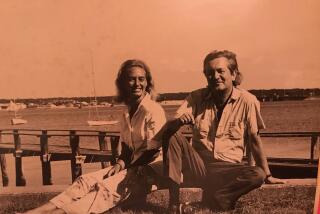Meta Wilde; Wrote About Faulkner Affair
- Share via
Meta Carpenter Wilde, whose Southern roots formed the basis of an 18-year intimacy with William Faulkner that she portrayed in a best-selling 1976 memoir, has died.
Orin Borsten, her co-author in “A Loving Gentleman: The Love Story of William Faulkner and Meta Carpenter,” said Wednesday that his longtime friend had died Tuesday while visiting relatives in Kansas City, Mo.
She was 86 and had been living in Century City.
The daughter of a successful cotton planter in Tennessee, she was trained as a concert pianist before coming to Hollywood, where she became a model and music librarian.
She also became secretary to film director Howard Hawks, who in 1935 made her his script supervisor. When she retired in 1976, she had succeeded in forming a Script Supervisors Union and in 1985 was honored with the lifetime achievement Crystal Award by the Los Angeles-based group Women in Film.
But her relationship with Faulkner was what had made her a national figure.
Her forebears, like Faulkner’s, lived on a family plantation, owned slaves and fought in the Civil War.
Faulkner had come to Hollywood in 1935 to work on the Hawks film “The Road to Glory.” He loathed Hollywood but needed the income to maintain his home in Oxford, Miss. Mrs. Wilde, who was single at the time they met but married later, was attracted to the seemingly aloof and aristocratic author even though he had a wife and daughter in Oxford and her traditional Southern instincts were to avoid involvement.
What resulted was an intimate relationship that lasted 18 years.
In an unpublished chapter from her book, she recalled how they had “grown up on the same (Southern) soil . . . had rolled in its rich mud, sprawled on its offerings of fern, clover and wild violet. I could make him forget for hours on end that he was so far from home.”
Their relationship became widely known and after the death of Faulkner and his wife, Borsten encouraged her to write about their years together.
She agreed, she said later, out of concern that a third party would emerge and set forth what she and Borsten feared could be a lurid, dramatized account of their involvement.
She also said she wanted to present a more balanced view of the Nobel Prize-winning writer.
“Many don’t want to see any change in the public image of Faulkner as an antisocial, hard-drinking, cynical, bitter, dour, unpleasant, sometimes rude, sometimes crude, man,” she told one interviewer.
“But this wasn’t the William Faulkner I knew. He was a loving, gentle man. My lover, my friend, a great joy in my life.”
By then she was married to Arthur Wilde, a film publicist, who survives her and who encouraged her writings.
Although some critics were dismayed that she had publicly shared her relationship with the acclaimed author, others were enthusiastic.
Carvel Collins, a Faulkner biographer, found the correspondence a valuable aid and even Malcolm Cowley, the editor and writer who helped reintroduce Faulkner to the world in the 1950s and who would have preferred that Mrs. Wilde remained silent, confessed “to having read (the book) with sharp interest and not a little profit.”
More to Read
Only good movies
Get the Indie Focus newsletter, Mark Olsen's weekly guide to the world of cinema.
You may occasionally receive promotional content from the Los Angeles Times.










